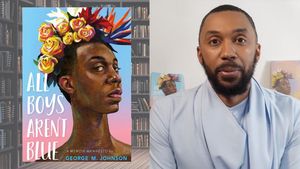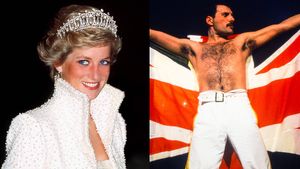While weddings are dedicated to celebrating love, the rituals and traditions surrounding matrimony are often outdated and don't represent all love — especially for LGBTQ+ couples. But that doesn't mean there aren't steps you can take to update your wedding to be more mindful and inclusive.
Whether or not you identify as LGBTQ+, chances are that at least some of your guests do. After all, according to a recent poll, one in four Gen Zers identify as LGBTQ+ while 16 percent of millennials identify as part of the community.
And while weddings may tend to be steeped in heteronormativity, you certainly don’t have to plan yours that way. Follow our lead on ways to make your wedding more gender-inclusive, so you and your guests can feel welcomed and respected.
Language Counts
Words are powerful, and unfortunately, a quick browse of the majority of wedding publications (with the exception of Love Inc., of course!), shows that the verbiage is geared toward a cishet bride marrying a cishet groom. Ensure that anyone you work with (as well as their staff) is well-versed in inclusivity and avoids using gendered terms throughout the planning process and the event itself. Even if your own gender expression may not be affected, you want to ensure that your guests are treated properly, such as the valet or caterers avoiding assumptions and mislabeling guests as “ma’am” or “sir.”
Be sure to communicate with anyone who is going to have access to a mic that day that inclusivity is important and they should avoid using gendered phrases such as “ladies and gentlemen.” Some key players to note: officiant, DJ/band, emcee, and those who are giving toasts.
Pre-Wedding Events
Before the wedding even begins, pre-wedding event traditions put people into two-gender boxes with a bachelorette party for the girls and bachelor party for the guys. Throw this outdated tradition out the window and celebrate your bach party, your way. That can mean a mixed-gender guest list, doing a joint bach and, simply, inviting whoever who want. And while themes are fun, keep the attendees’ identities in mind before requiring specific dress codes to ensure everyone feels comfortable.
Similarly, society’s version of the pre-wedding shower is bride-focused with a female-only guest list, but we’re now seeing more couples being celebrated in this way with couples’ showers featuring a guest list of their nearest and dearest (because really, why should one person get all of the glory?).
The Wedding Vendors
Wedding vendors are the unsung, behind-the-scenes heroes that work incredibly hard to pull off an unforgettable fête, and without their dedication, all the little details that make a wedding day special would cease to exist. By pledging to use only "equality-minded®" vendors who are excited to work with all couples, you can help foster change and lead to a more inclusive mindset in the industry. Ensure that the wedding pros you work with have formally trained themselves and their staff on inclusivity and gender-awareness so they can not only give you a better experience, but also your guests.
If you're looking for vendors for your big day, check out the Love List, Love Inc.’s curated list of equality-minded® wedding pros, and rest assured that you have people in your corner who support your love or will show your guests the utmost respect on your wedding day.
The Wedding Venue
In an ideal world, you’ll find an amazing space that has two equally designed getting-ready rooms. Unfortunately, many venues still boast a “bridal suite” that is much bigger than the “groom’s room” to accommodate hair and makeup artists — and they are often decorated with a traditional bride in mind. This can be particularly frustrating for many LGBTQ+ couples, and if the rooms aren’t to your liking, do not feel obligated to get ready there.
You’ll also want to try and find a venue that has non-gendered bathrooms (which, admittedly, can also be a challenge). If your venue has separate, gendered bathrooms, you can put a sign over theirs to ensure welcoming spaces for all. Don't forget to include all genders' toiletry items in both.
The Stationery
While etiquette is important, respect trumps whatever Emily Post may preach. Any envelope addressing should be reflective of the individual. Use proper honorifics (example: Mr., Mrs., Mx., Rp.) on invitations and escort/place cards and allow guests to fill in their own titles on the RSVP cards (or leave off altogether). Remember, pronouns and titles are fluid, so even if you think you know someone's pronouns, never assume. Be sure to confirm before printing save-the-dates, invitations, and escort/place cards.
If you’re relaying dress code, either on your invitations or wedding website, avoid gendered terminology such as “men in suits,” and simply communicate the level of formality you expect from guests (i.e., semi-formal).
The Wedding Party
Long gone are the days of girls on one side, boys on the other. Even hetero couples are getting in on the mixed-gender wedding party and selecting their faves, no matter their gender, has become quite common.
And while you can always select the attire’s color so that it’s consistent with your wedding palette, never force a certain look on someone. If they’re not comfortable in a dress, give them the option to wear something that is more in line with their identity, while still fitting in with your wedding party attire.
And if you’re having floral personals for your wedding party, such as bouquets, corsages, or boutonnieres, ask their preferences instead of assigning per gendered traditions. (This also applies to soonlyweds!)
The Ceremony
For the processional (followed by recessional and then reception entrance), don’t force opposite-sex pairings of your wedding party. Instead, have them walk solo or partner up based on the order of which they’re standing.
For your own grand entrance, don’t feel tied to the tradition of one person meeting their future spouse at the altar. There are so many options – choose one that fits you as a couple. You can each have your moments walking down the aisle, have two aisles, meet halfway down the aisle, walk down the aisle together, or even receive people into the ceremony space.
In the ceremony script itself, you’ll want to have already discussed with your officiant ahead of time about proper language (see above) and avoid any gendered terminology. Decide as a couple how you want to be pronounced, such as, 'I now pronounce you husband and husband,' or 'I now pronounce you partners for life,' so that no assumptions are made by the officiant and it’s reflective of you as a couple.
The Reception
From post-ceremony traditions such as the bouquet and garter tosses to the father-daughter and mother-son dances, it's time these traditions got a more inclusive, modern update. Many couples have opted to exclude outdated, gender-specific traditions altogether, but if you still want to include them in your celebration, consider opening up the garter or bouquet toss to all who want to participate and rebrand the dances to special-person dances (and no, they don’t have to be with a parent!).
With any aspect of the wedding, don’t feel tied to what you’re “supposed to do.” Make your day a representation of you and your love story. The absolute best weddings are the ones in which guests walk away and think, “Wow, that was so them.”
For more inclusive wedding planning inspiration, ideas and advice, head to loveincmag.com.
Brittny Drye is the founder and editor in chief of Love Inc., a leading LGBTQ-inclusive wedding blog and print publication, and host of Inclusively Yours, an LGBTQ-inclusive podcast highlighting wedding planning tips and love stories. Named by Forbes as “The Woman Leading the Way to a More Inclusive Wedding Industry," Drye has also been featured in The New York Times, The Washington Post, and more for her expertise in inclusivity in the wedding industry.




















































